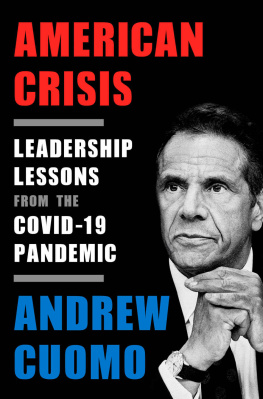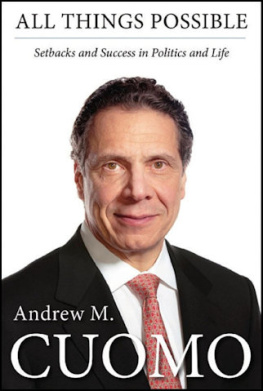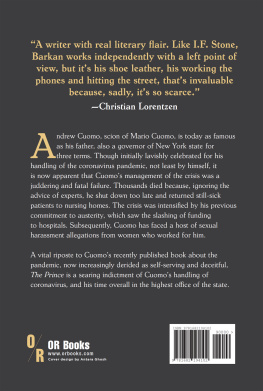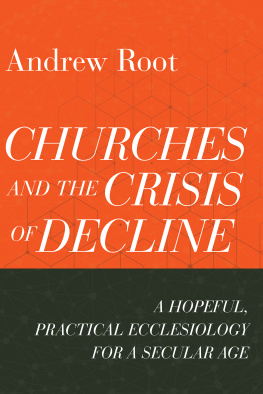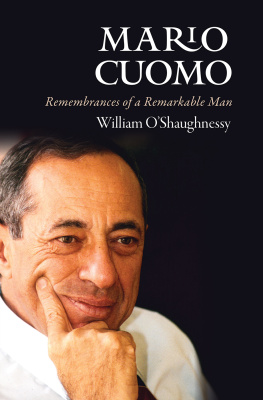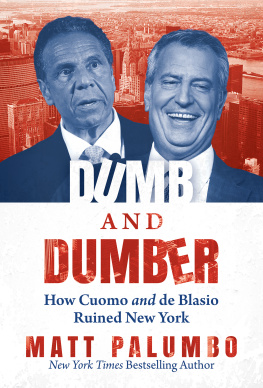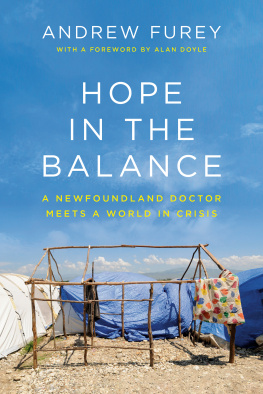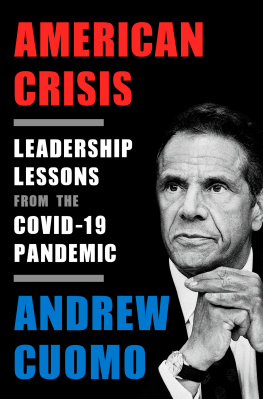Andrew M. Cuomo - American Crisis
Here you can read online Andrew M. Cuomo - American Crisis full text of the book (entire story) in english for free. Download pdf and epub, get meaning, cover and reviews about this ebook. year: 2020, publisher: Crown, genre: Politics. Description of the work, (preface) as well as reviews are available. Best literature library LitArk.com created for fans of good reading and offers a wide selection of genres:
Romance novel
Science fiction
Adventure
Detective
Science
History
Home and family
Prose
Art
Politics
Computer
Non-fiction
Religion
Business
Children
Humor
Choose a favorite category and find really read worthwhile books. Enjoy immersion in the world of imagination, feel the emotions of the characters or learn something new for yourself, make an fascinating discovery.
- Book:American Crisis
- Author:
- Publisher:Crown
- Genre:
- Year:2020
- Rating:5 / 5
- Favourites:Add to favourites
- Your mark:
- 100
- 1
- 2
- 3
- 4
- 5
American Crisis: summary, description and annotation
We offer to read an annotation, description, summary or preface (depends on what the author of the book "American Crisis" wrote himself). If you haven't found the necessary information about the book — write in the comments, we will try to find it.
American Crisis — read online for free the complete book (whole text) full work
Below is the text of the book, divided by pages. System saving the place of the last page read, allows you to conveniently read the book "American Crisis" online for free, without having to search again every time where you left off. Put a bookmark, and you can go to the page where you finished reading at any time.
Font size:
Interval:
Bookmark:

The opinions and statements contained in this book are those of the author only and do not represent those of any state government agency.
Copyright 2020 by Andrew M. Cuomo
All rights reserved.
Published in the United States by Crown, an imprint of Random House, a division of Penguin Random House LLC, New York.
C ROWN and the Crown colophon are registered trademarks of Penguin Random House LLC.
Hardback ISBN9780593239261
Ebook ISBN9780593239278
crownpublishing.com
Book design by Barbara M. Bachman, adapted for ebook
Cover design: Christopher Brand
ep_prh_5.6.0_c0_r0
I NORMALLY DONT TURN OFF MY cellphone when I sleep, because the work of being governor is literally twenty-four hours a day, and the phone pings all night long. If Im really tired, I will turn it off, but that doesnt mean people cant get me; its just harder. My office phone is always answered, at night by a New York State trooper. Callers must convince the trooper that their issue is really important. Some troopers are easier to convince than others. Some troopers decide that its safer to put all callers through, but as I joke to my team, those troopers learn quickly that it is not in fact safer when they are then assigned to different duties.
When my cellphone rang late on March 1, I hadnt turned it off, but I didnt get to it in time. Moments later, the landline rang. It was Melissa DeRosa, secretary to the governor and my top aide. Brilliant, tough, indefatigable, and widely respected, she is the quarterback on my team and is responsible for managing all the pieces.
Governor, Im sorry to stalk you with the multiple calls, but we just received a confirmation from Wadsworth. This was the New York State Department of Healths lab in Albany. New York has its first case of coronavirusa health-care worker who just returned to New York City from Iran. We believe the incident is isolated. I have Dr. Zucker on the other line. Can I conference him in?
Please put him through, I said.
As the state health commissioner, Dr. Howard Zucker, began to run through the patients background, symptoms, and literal steps taken between landing at JFK airport and reaching her apartment in Manhattan, it seemed as though white noise washed over the line. I couldnt prove it, but I knew this wasnt New Yorks first coronavirus case. And I knew the country wasnt prepared.
The good news that night was that this was a fairly straightforward case, which would hopefully not cause great public alarm: The thirty-nine-year-old woman had traveled to Iran to provide health services and returned to New York feeling ill, but she knew to take precautions and did not come in contact with many people. She had been traveling with her male partner and had worn a mask. She took an Uber from the airport to her apartment and then called ahead to the hospital to make arrangements to be tested. In many ways it was the best-case scenario: an informed health-care worker who did the right thing.
However, even this single case in the state of New York presented complications and foreshadowed what was to come. What flight did she take? Could she have infected people on the plane? Who was responsible for contacting all the passengers on the flight? How about the Uber driver? Were the proper precautions taken at the hospital? These were the operational issues that we would need to figure out and standardize quickly, and they were mind-boggling when we considered the volume of cases we could anticipate given what we already knew about the virus.
A few weeks earlier, we had received the first taste of what was to come. On February 6, I was sitting at my desk in my New York City office at 633 Third Avenue in Manhattan working on a speech. My director of administration, Stephanie Benton, came in because I had an important call. Stephanie organizes the executive chamber operations and has been with me since I started as attorney general, fourteen years ago. She can juggle ten balls at a time and always does it with a smile. I am fully aware that my ability to function and get things done is dependent on Stephanie and the strong team around her.
On the phone line was Rick Cotton, the executive director of the Port Authority of New York and New Jersey, a powerful agency that operates bridges, tunnels, and airports, as well as the Port of New York. Rick called to tell me that federal Department of Health and Human Services (HHS) officials had contacted him about passengers on a cruise ship nearby who they believed were positive for COVID-19. HHS wanted to dock the ship at a Port Authority facility and New York to take charge of the patients.
The novel coronavirusformally the severe acute respiratory syndrome coronavirus 2 (SARS-CoV-2), which is the virus that causes the disease weve come to know as COVID-19was at that time thought to be largely contained in China, with a few scattered cases in Washington and California. But this was the first case that would come knocking on New Yorks door.
When the call came in, the Ebola crisis from years earlier flashed in my mindhow we handled it, what went right, and what went wrong. In 2014, a health-care worker who had been helping out with an Ebola outbreak in Africa returned to New York after having contracted the disease. He rode the subway, ate in a restaurant, and visited a bowling alley before he knew he was sick. People got scared. Governor Chris Christie of New Jersey and I held a joint press conference, because we shared control of the Port Authority, to announce a policy to screen people at the airports and, if necessary, quarantine them. When another health-care worker arrived at Newark airport, also returning from Africa, airport officials ordered the woman held in quarantine in a tent at the airport, where she was given nothing more than granola bars and a cellphone, which she quickly used to call CNN. We hadnt forgotten the pitfalls of forced quarantine.
As would happen again and again over the course of this emergency, dozens of questions flooded my thoughts: What if the patients said they wanted to leave? What was the Department of Healths authority to hold patients? If patients agreed to come with us, where should we bring them? Do they need a hospital? Do the hospital and medical staff need to take special precautions? If we are quarantining them in a hotel, do we have the legal authority to force them to stay? Can they leave the hotel room at all? How do they get meals? Can housekeeping staff enter the room? What medical assistance do they need? How long will they be sick?
The questions were obvious, and the answers were few. HHS was alarmingly ignorant. In the end, the ship docked in Bayonne, New Jersey, and the four passengers who were transferred to a hospital for further evaluation tested negative, but the situation gave me the first true sense that we were on a journey to a place we had never been before. I sat back and wondered, how did the great United States of America get to this point?
When COVID first hit, it was inconceivable to me that the federal government would abandon its basic role of managing a federal emergency, but that is exactly what would happen as soon as they understood the depth of the problem, the complexity of the solution, and the political pain that needed to be endured in the coming weeks and months. Before the extent of the crisis was revealed, the federal government initially sought control. The Centers for Disease Control (CDC) and the Food and Drug Administration (FDA) were very possessive of the initial testing strategy, deciding who should be tested, when they would be tested, when states would receive the results, and who was being screened at airports and how. Making the bureaucratic nightmare worse, every single test was routed to a single lab in Atlantaa lab that, by the middle of February, had already been known to return faulty results. It was clear that building out testing operations would be key to controlling the spread not just in New York but in the whole country. You didnt have to have spent a lifetime in government to know the system in place was set up for failure.
Font size:
Interval:
Bookmark:
Similar books «American Crisis»
Look at similar books to American Crisis. We have selected literature similar in name and meaning in the hope of providing readers with more options to find new, interesting, not yet read works.
Discussion, reviews of the book American Crisis and just readers' own opinions. Leave your comments, write what you think about the work, its meaning or the main characters. Specify what exactly you liked and what you didn't like, and why you think so.

